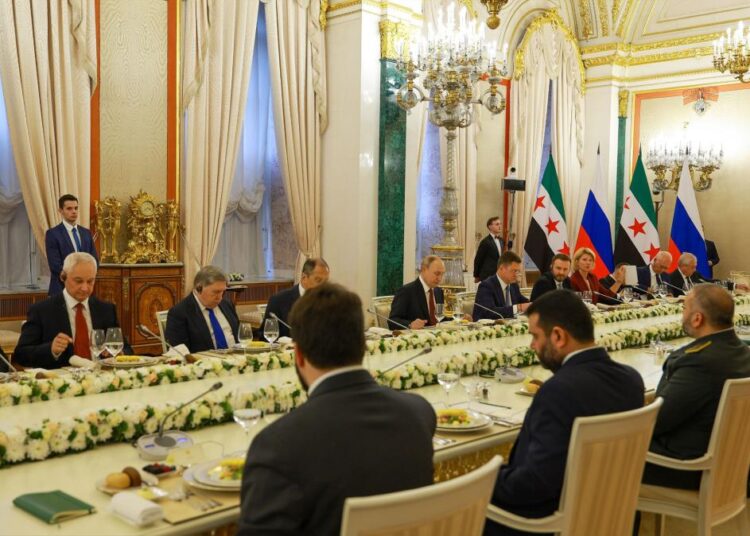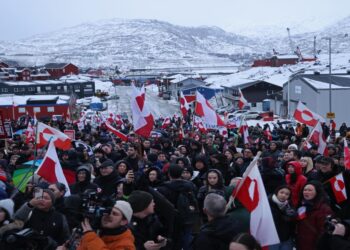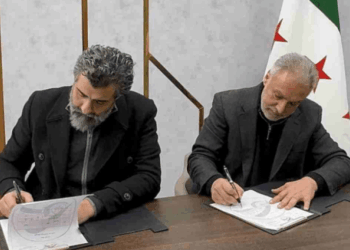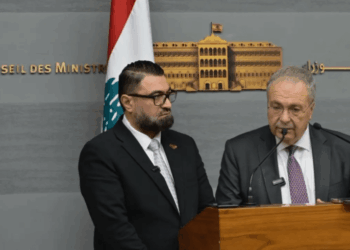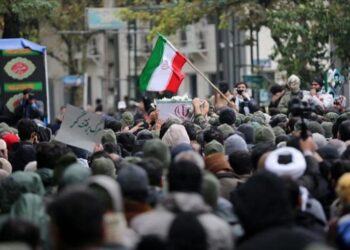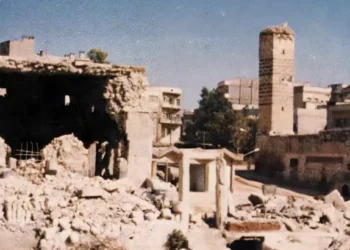Fadel Abdulghany
Normalization of the relations between Syria and Russia after years of the unlawful Russian military intervention in Syria represents unprecedented challenges for international law and transitional justice. Since September 30, 2015, and until the fall of the Assad Regime on December 8, 2024, the documented violations that have been perpetrated by the Russian military intervention, altered the picture drastically for any legal framework that would be the base for any future relations between the two countries.
According to the Syrian Network for Human Rights (SNHR), the Russian forces killed 6,993 civilians, including 2,061 children and 984 women, committed 363 massacres, and targeted at least 1,262 vital civilian facilities. Russia also obstructed international accountability mechanisms by using its veto power in the Security Council eighteen times to protect the Assad regime and prevent the referral of the case to the International Criminal Court. These actions create binding legal obligations under international humanitarian law and peremptory norms of public international law, going beyond traditional diplomatic balancing, and making any approach to normalization conditional on accountability for war crimes and crimes against humanity, comprehensive reparations for victims, and effective guarantees of non-recurrence.
Accountability and Obligations Under International Law
The principle of accountability for serious violations of international humanitarian law is a foundational condition for any Syrian-Russian normalization. International law establishes clear obligations on states responsible for war crimes and crimes against humanity, including through command responsibility and individual criminal responsibility. The documented violations attributed to Russian forces, including the deliberate targeting of civilians, systematic attacks on medical and educational facilities, and the use of internationally prohibited weapons, constitute grave breaches of the Geneva Conventions that entail mandatory obligations to investigate and prosecute. The accountability framework goes beyond political recognition to concrete prosecution mechanisms. The principle of individual criminal responsibility, firmly established in international custom, requires that military and political leaders who planned, ordered, or oversaw such attacks be subject to investigation and prosecution. This obligation stems from the rule established in Common Article 1 of the Geneva Conventions, which requires all states to “respect” and “ensure respect for” the Conventions in all circumstances. This creates direct obligations for the perpetrating state and obligations for other states as third parties. The principle of “aut dedere aut judicare” (investigation or extradite) for the most serious crimes also serves as a procedural standard necessary to implement these obligations.
The issue of extraditing criminal Bashar al-Assad is also central to this framework. According to Article 1, paragraph (f), of the 1951 Convention relating to the Status of Refugees, protection is excluded from any person regarding whom there are serious grounds for suspicion of having committed war crimes or crimes against humanity. UN General Assembly Resolution 3074 (XXVIII session of 1973) also affirms that states must refrain from granting asylum to anyone for whom there are serious grounds for believing that he has committed a crime against peace, a war crime, or a crime against humanity. Accordingly, Russia’s harboring of Assad is not only a political obstacle, but also a violation of treaty and international obligations, making his handover to the competent Syrian authorities a fundamental legal condition for any process of normalizing relations.
A Framework for Redress and Reparations
The obligation to provide full reparation for internationally wrongful acts is a fundamental principle of international law, clearly enshrined by the Permanent Court of International Justice in the Chorzów Factory case, which ruled that reparation “should, as far as possible, erase all the consequences of the wrongful act and restore the situation that would have existed had that act not occurred.” For victims of violations attributed to the Russian intervention in Syria, this principle provides a multidimensional framework that includes restitution, compensation, rehabilitation, satisfaction, and guarantees of non-repetition.
The reparations framework should address both material and moral damages resulting from Russian military operations. Restitution requires restoring the status quo ante, including the revocation of coercive agreements and the return of confiscated land and property. Restitution is the ideal form of reparation where feasible, but the widespread destruction in Syria caused by Russia requires complementary compensatory measures. The compensation component should cover financially assessable damages, including direct material losses such as the destruction of property and loss of sources of income, as well as non-material losses such as psychological harm, loss of educational opportunities, and the breakdown of family ties.
Rehabilitation measures are a key component of the reparations system, requiring the provision of comprehensive medical, psychological, legal, and social services to ensure victims’ recovery and reintegration. The United Nations Basic Principles and Guidelines on the Right to a Remedy and Reparation affirm that victims of gross violations of international humanitarian law have an enforceable right to adequate, effective, and prompt compensation commensurate with the gravity of the violations. This creates an obligation for Russia to develop practical programs that provide comprehensive support services to affected groups.
The element of satisfaction requires formal acknowledgment of violations, explicit expressions of regret, and an unequivocal public apology. This goes beyond diplomatic courtesy; it constitutes a legal obligation arising from a state’s responsibility for the internationally wrongful act. Russia must therefore formally acknowledge responsibility and offer a clear public apology for the violations committed during its military intervention, as this serves both a symbolic and practical purpose, as it confirms the suffering of the victims and establishes a realistic basis for implementing other reparation measures.
The reconstruction dimension within the framework of reparations requires direct Russian contribution to the restoration and rebuilding of infrastructure destroyed by military operations, including energy facilities, transportation networks, medical facilities, schools, and other vital facilities that were systematically targeted. This commitment represents an economic opportunity and, more importantly, a legal responsibility arising from internationally wrongful acts. This requires that reconstruction efforts proceed according to an approach based on the rights of victims and ensuring their active participation in setting priorities and implementation methods, ensuring the effectiveness and sustainability of measures and preventing the recurrence of violations.
Transitional Justice System and Guarantees of Non-Recurrence
The integration of transitional justice mechanisms is a fundamental pillar of any framework for normalizing Syrian-Russian relations. International law requires that guarantees of non-recurrence fulfill two interconnected functions: preventive and remedial, enhancing future institutional performance while simultaneously addressing past violations. These guarantees require the establishment of effective arrangements to prevent the recurrence of attacks on civilians and vital facilities, the adoption of legal and institutional reforms to ensure compliance with international humanitarian law, and the adoption of independent verification mechanisms to monitor the implementation of international obligations, along with concrete measures in the areas of disarmament and reducing future military interventions.
Fact-finding processes are a central component of the transitional justice system, as they enshrine victims’ right to know the truth about the violations they suffered. The Syrian authorities have established a national transitional justice body to investigate grave violations. Russia’s cooperation with this body requires access to relevant military records and documents and enabling the testimony of Russian military personnel involved in operations. These obligations are based on the rules of treaty law and the principles of customary international humanitarian law, which oblige states to investigate violations and ensure respect for humanitarian law.
Preserving documentation and continuing investigations are ongoing commitments that cannot be terminated by political agreements. The comprehensive data accumulated by the Independent International Commission of Inquiry, the Syrian Network for Human Rights, and others over fourteen years constitutes effective evidence for future accountability mechanisms. Any normalization framework must therefore protect and enhance documentation efforts, while ensuring that evidence is available for national and international judicial proceedings. This includes preserving the chain of custody of physical evidence, protecting witness testimonies, and securely preserving digital archives of human rights and international humanitarian law violations as part of national history and narrative.
Conclusion
The Syrian authorities cannot approach the normalization of Syrian-Russian relations through traditional diplomatic channels, given the scale and severity of the violations documented during the Russian military intervention. International law sets non-negotiable conditions that precede any normal relationship: accountability for perpetrators of war crimes and crimes against humanity; full reparations that address the human, material, and moral losses suffered by Syrian victims; strong guarantees of non-repetition; and effective support for transitional justice mechanisms that place victims’ rights at their core. These requirements stem from peremptory norms that cannot be waived through political settlements or diplomatic arrangements. Therefore, surrendering Bashar al-Assad, lifting diplomatic obstacles to accountability processes, and launching victim-centered reparations programs are fundamental legal obligations arising from Russia’s responsibility for internationally wrongful acts. Any framework that goes beyond these conditions will foster impunity, undermine the rule of law, and deprive thousands of victims and their families of justice.
